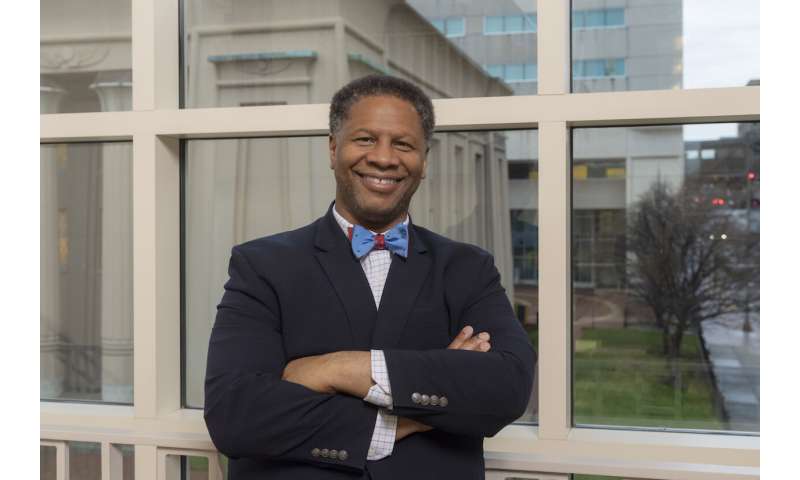
Even though he was just appointed director of VCU Massey Cancer Center in December, Robert Winn, M.D., already has become an asset to the African American faith community in Richmond.
The moment Winn realized that timely and accurate information about COVID-19 was not getting out to area churches, he stepped in and formed a partnership with black clergy and started a series of conference calls named Facts and Faith. During the weekly calls, Winn provides the latest numbers and facts on the virus along with ways churches can keep their congregations safe.
“It wasn’t evident what our African American communities were supposed to do. People were frightened and confused,” Winn said. “There was a myth that African Americans couldn’t get COVID-19. We at Massey Cancer Center and VCU Health wanted to give them good, reliable information as we had it and bust the myths.”
The conference calls began after Rudene Mercer Haynes, a partner with the Hunton Andrews Kurth law firm, connected Winn with the Rev. F. Todd Gray of Fifth Street Baptist Church.
“I thought it was critically important for Dr. Winn to be introduced to the clergy in the African American community,” Haynes said, adding that her husband is a pastor. “Rev. Gray has a large network of pastors. After Bishop Gerald Glenn of New Deliverance Evangelistic Church died of COVID-19, Rev. Gray asked, ‘What should we do to disseminate information to the black community?'”
Gray was impressed with Winn’s commitment to the community’s health.
“From our initial conversation, I realized the way we could collaborate with VCU has broadened,” Gray said. “Dr. Winn has a genuine interest in the community that goes beyond a professional relationship.”
Diminishing disparities
Gray hopes the collaboration will develop a level of trust between the African American community and the health community in order to diminish disparities.
“Dr. Winn wants to educate our people so they will seek medical attention for their health care needs,” Gray said. “One reason our community has a higher death rate is because we have health issues and don’t access medical care.”
One question that Winn hopes can be addressed is why African American communities seem to be hit harder with the virus. “Quite honestly, it’s more about the ZIP code,” he said. “That’s more important than the DNA.”
There have been disparities in some communities for decades, Winn said.
“You have social deterrents such as health, housing and education as well as the socioeconomics of neighborhoods,” he said. “As a result, you have poor and underserved communities.”
In principle, social distancing helps slow the spread of COVID-19, but only if you have space to create distance, Winn said.
“When you have a large number of people living in a house, or people living on top of one another, social distancing isn’t possible,” he said.
Looking at facts and brainstorming ideas
The weekly conversations Winn has with the clergy have covered everything from proper personal protective equipment and social distancing to how churches can open their doors safely.
“I feel very good about our Facts and Faith conversations,” Haynes said. “Health and wellness is something we haven’t focused enough on in the faith community. Having pastors hear the dangers of the virus from credible sources is incredibly impactful. It’s a safe forum for questions on reopening. It’s been a great dialogue. I think this has a life after COVID-19 is over and done.”
Pastors on the calls have had the chance to brainstorm ideas about the safe reopening of churches.
“One of the pastors mentioned that having glass in front of the podium would give you freedom to preach without transmitting the virus,” Winn said. “That idea came out because we had a group of ministers and health care professionals thinking aloud together. I am impressed by these reverends.”
Winn advised pastors to help their congregations get healthier by supporting exercise and a healthy diet while the country waits for a vaccine for COVID-19. Being healthier will “make them safer from disease,” Winn said.
Several VCU health care professionals on the calls have addressed different issues, such as heart disease. Pastors were able to hear the cardiologist on the call talk about his concerns, noting that appointments and emergency room admissions have gone down since the quarantine.
“More people are dying at home because they are afraid to come into the hospital,” Winn said. “When you go to the hospital it’s safe because health care professionals know what they are doing and because they are testing for COVID. By working together, we are all dispelling myths and providing accurate data.”
The number of participants on the Facts and Faith calls has grown from about 30 to hundreds, Winn said.
“This is a great example of being community activated,” he said.
Pastors are now able to provide accurate information to their congregations and the community where they live. “That is what I am proud of,” Winn said. “Also, I couldn’t be prouder of the VCU Health System and Massey Cancer Center for giving me the opportunity to reach out and engage with the community. Everyone at the institution has been supportive of my being out in the community. I feel lucky to be at an institution that supports community and is engaged in a meaningful and direct way.”
Gray likes the fact that the calls are addressing both the immediate needs of the pandemic as well as broader health issues.
Source: Read Full Article
